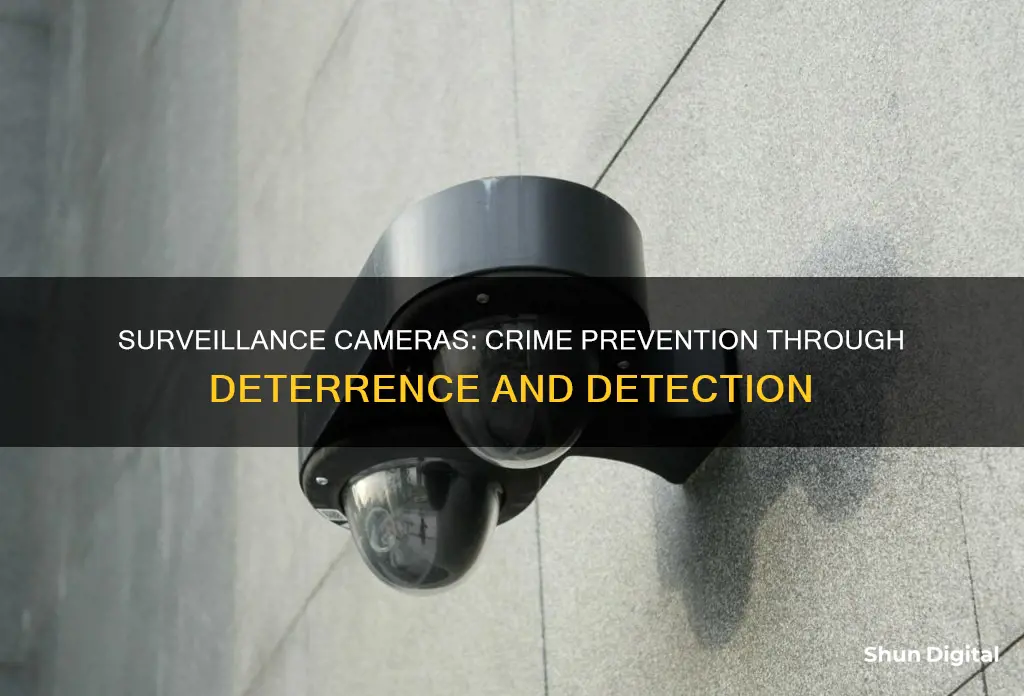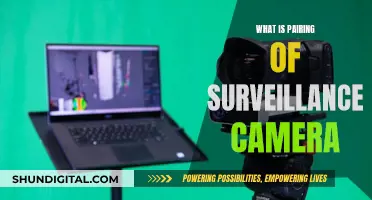
Surveillance cameras are a double-edged sword when it comes to crime prevention. On the one hand, they are touted as a deterrent, with some studies showing that they do indeed prevent crime and make neighbourhoods safer. For instance, in Orange County, New Jersey, surveillance cameras led to a 50% drop in all types of crime. On the other hand, there is evidence that they may not be as effective as believed, and in some cases, they might even increase the likelihood of criminal activity, as criminals can disable or destroy them. Additionally, the use of surveillance cameras raises privacy concerns, with critics arguing that they invade privacy and set a dangerous precedent for government surveillance.
| Characteristics | Values |
|---|---|
| Crime reduction | Surveillance cameras have been linked to reduced crime rates in cities such as Baltimore and Chicago. |
| Crime deterrence | The presence of security cameras can deter criminals from targeting a property. |
| Crime displacement | There is mixed evidence on whether surveillance cameras displace crime to other areas. Some studies suggest they can make entire neighbourhoods safer, while others found no significant impact on crime rates in certain areas. |
| Crime detection and investigation | Surveillance cameras can aid in detecting and investigating crimes by providing additional leads, securing witness cooperation, and complementing eyewitness evidence. |
| Cost-effectiveness | Surveillance camera systems can be cost-effective, with potential cost savings associated with crimes averted. |
| Limitations | Surveillance cameras are not foolproof and may have technical failures or limitations in capturing events clearly, especially at night or in bad weather. |
| Privacy concerns | The use of surveillance cameras raises privacy concerns, and proper guidelines and policies should be in place to protect civil liberties. |
What You'll Learn

Surveillance cameras can deter burglars
In a study of Newark, New Jersey, Rutgers University School of Criminal Justice found that residential burglar alarm systems decrease crime in homes and in the city overall. The study also showed that neighbourhoods with more burglar alarms had fewer incidents of residential burglaries.
The effectiveness of surveillance cameras in deterring crime was also seen in Baltimore and Chicago. The Urban Institute's research showed that the installation of cameras in these cities led to a significant reduction in crime, even beyond the areas with camera coverage. In downtown Baltimore, 500 cameras led to a reduction in crime by an average of 30 incidents per month, with no evidence of displacement. In Chicago, the more than 8,000 cameras installed were responsible for almost a 12% estimated reduction in crime.
The presence of a security camera can make it more difficult for a potential burglar to break in without being caught. If you have a visible security camera system, it is less likely that your home will be targeted by burglars. Even fake security cameras can help deter potential criminals.
However, it is important to note that surveillance cameras are not always effective in deterring crime. In some cases, they may even increase the likelihood of criminal activity as criminals can find ways to disable or destroy them. A study by Queen's University Surveillance Studies Centre found 168 technical failures that prevented evidence from being used in criminal trials.
To make the most of surveillance cameras, it is recommended to ensure they are visible and well-maintained. Consulting with a professional can help ensure proper installation, positioning, and configuration.
Understanding Tapo Camera's Home and Away Modes
You may want to see also

They help catch criminals
Surveillance cameras are a valuable tool in the fight against crime, and they play a crucial role in catching criminals and aiding law enforcement.
The presence of security cameras can act as a deterrent, causing criminals to think twice about their actions. This is because criminals do not want to be seen or recorded, and the risk of being identified and caught increases significantly with surveillance cameras. In some cases, the mere presence of security cameras has been enough to prevent a crime from taking place. For instance, a study by the Municipal Technical Advisory Service found that CCTV cameras effectively deterred crime, especially when paired with good lighting conditions.
However, it is important to note that security cameras do not guarantee the prevention of a crime. In certain instances, they may even become a target of vandalism or destruction by criminals. Nevertheless, when they are functioning properly, security cameras provide invaluable assistance in catching criminals and aiding investigations.
Surveillance cameras help law enforcement in several ways. Firstly, they provide additional leads and evidence during an investigation. They can capture vital footage of a crime in progress, which can then be used to identify and track down suspects. This was notably the case in the Boston Marathon bombing, where investigators were able to identify the suspects by reviewing video footage from the city's cameras. Secondly, surveillance cameras can aid in securing witness cooperation. Witnesses may be more inclined to come forward and provide information if they know that there is supporting video evidence. Lastly, video footage can serve as a valuable complement to eyewitness accounts in a courtroom setting, strengthening the case against the accused.
In addition to their crime-fighting capabilities, surveillance cameras can also provide a sense of security and peace of mind to homeowners and businesses alike. The knowledge that one's property is being monitored can be reassuring and act as a powerful deterrent against potential intruders.
While the use of surveillance cameras may raise concerns about privacy invasion, it is possible to strike a balance between public safety and individual privacy rights. For example, guidelines can be established to address privacy issues, such as avoiding or masking views of private areas like yards and upper-story windows. Law enforcement agencies should also be transparent about their surveillance policies and ensure that officers are well-trained and accountable for their actions.
Dovima with Elephants: Camera Process Secrets Revealed
You may want to see also

Cameras aid police investigations
Surveillance cameras are an invaluable tool for police investigations, providing additional leads and aiding in securing witness cooperation. They can also help identify suspects, as demonstrated in the Boston Marathon bombing case, where investigators used video footage from city cameras to identify the two suspects. This successful use of surveillance technology in a high-profile case is likely to encourage other cities to invest in and expand their use of cameras for crime prevention and solution.
The use of surveillance cameras has sparked debates about privacy versus safety. However, public surveillance cameras and civil liberties can coexist if implemented and employed responsibly. For example, cameras should avoid invading private areas, and law enforcement agencies should have clear policies governing the use of surveillance footage and consequences for misuse.
The effectiveness of surveillance systems is enhanced when monitored by trained staff and integrated into various law enforcement activities. For instance, in Baltimore and Chicago, camera systems were linked to reduced crime rates, even beyond the areas under camera coverage. The cost savings associated with crimes averted through camera systems in Chicago resulted in a return of over four dollars for every dollar spent on the technology, while Baltimore saw a 50-cent return on each dollar invested.
Surveillance cameras also played a crucial role in reducing crime rates in Orange County, New Jersey. The installation of cameras around the city resulted in a 50% drop in all types of crimes. The local police noted that access to surveillance recordings made it easier to investigate cases and apprehend offenders.
In summary, while surveillance cameras have their limitations and should be used alongside traditional police work, they are a valuable tool for aiding police investigations, deterring crime, and enhancing public safety.
Importing Camera Raw Files into Adobe Premiere: A Step-by-Step Guide
You may want to see also

They can reduce crime rates
Surveillance cameras can help reduce crime rates in several ways. Firstly, they act as a deterrent to potential criminals, who may be discouraged from committing a crime if they know they are being watched or recorded. This is supported by a study from the University of North Carolina, which found that 60% of burglars would choose another target if they saw security cameras.
Additionally, security cameras can aid in the detection and investigation of crimes. For example, in the case of the Boston Marathon bombing, investigators were able to identify suspects by reviewing footage from the city's surveillance cameras. This demonstrates how cameras can be a valuable tool for law enforcement in solving crimes and bringing criminals to justice.
Research has shown that the presence of surveillance cameras can lead to a significant reduction in crime rates. In Baltimore, the installation of 500 cameras resulted in a notable decrease in crime, with a 50-cent return on the dollar. Similarly, in Chicago, the use of surveillance cameras saved the city over four dollars for every dollar spent on the technology, indicating a substantial reduction in crime-related costs.
Furthermore, a study of Newark, New Jersey, revealed that residential burglar alarm systems not only decreased crime in individual homes but also made the entire neighbourhood safer. This contradicts the belief that security cameras merely displace crime to other areas, as the presence of alarms and cameras can create a safer environment for the whole community.
However, it is important to note that the effectiveness of surveillance cameras may vary depending on their placement, maintenance, and integration with other security measures. While they can be a valuable tool, they should be used responsibly and in conjunction with other crime-prevention strategies to maximise their impact on reducing crime rates.
Wireless Cameras: Charging Methods and Innovations
You may want to see also

Surveillance cameras can be a cost-effective solution
In Orange County, New Jersey, surveillance cameras contributed to a 50% drop in all types of crime. The police also found it much easier to investigate cases and apprehend offenders when crimes were committed. Similarly, the University of North Carolina in Charlotte found that 60% of 422 burglars surveyed would search for an alarm system and move on to another target if they found one.
Surveillance cameras are most effective when paired with other security measures such as lighting and alarms. For example, motion-activated lighting can increase the visibility of criminals, and some cameras have built-in spotlights. Additionally, cameras with built-in sirens and speakers can be used as a form of active deterrence.
While surveillance cameras can be a valuable tool, they are not a foolproof solution. Criminals may find ways to disable or destroy them, and they may even be seen as an indication of valuables inside a property. However, with proper maintenance and positioning, surveillance cameras can be a cost-effective way to deter, document, and reduce crime.
Mastering the GS6 Camera: Focus Tips and Tricks
You may want to see also
Frequently asked questions
Yes, surveillance cameras can deter crime. A study in Orange County, New Jersey, showed a 50% drop in all types of crime after installing cameras. Another study found that 60% of burglars would choose another target if they saw security cameras.
Criminals do not want to be seen or recorded, so they are less likely to target a property with visible security cameras.
No, surveillance cameras are not always effective. They can be disabled or destroyed by criminals, and in some cases, may even increase the likelihood of criminal activity.
Surveillance cameras can help to prevent and solve crime. They provide additional leads in investigations, aid in securing witness cooperation, and complement eyewitness evidence in the courtroom.
Surveillance cameras can be costly and may raise privacy concerns. They are also not a foolproof solution, as they can be tampered with or bypassed by criminals.







